- Top
- Entertainment
- Yuki Kawamura's early life and childhood
Yuki Kawamura's early life, childhood and career in Japan
He's been a practice bug since childhood!
Yuki Kawamura(勇輝 河村 in kanji) was born on May 2, 2001 in Yanai City, Yamaguchi Prefecture. The word "勇(Yu)" means courage and "輝(Ki)" means to shine. His parents are both school teachers, and he has two older sisters. He liked baseball, not basketball, as a child. He therefore played catch with his father every day.
Yuki's turning point came when he was in the second grade of elementary school. He visited a sports store to join a local baseball team. However, he did not think the baseball goods there were cool. Then his eyes fell on the basketball section next to the baseball section. There he thought the basketball uniforms were cooler. So he decided to join the basketball team instead of the baseball team. He changed his route because of the uniforms, but fortunately, his local basketball club had a good environment and a reputation for having very good coaches. It did not take long for him to get into basketball.
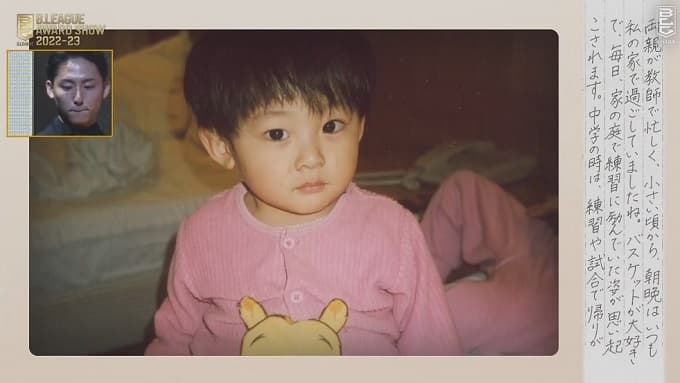
Yoshikazu, Yuki's father, was more favorable to Yuki's change of heart, although they had fewer opportunities to play catch together. Yoshikazu set up a basketball goal in the yard and also added a homemade net to prevent the ball from falling into the rice paddies. Yoshikazu also built a night game facility so that he could play basketball as much as he wanted. When it rained, Yoshikazu put a blue tarp over the yard so that when the rain stopped, he could move the tarp and play basketball right away.
Yuki said of that time, "Playing basketball not only in the gymnasium but also in that garden has been the foundation of my basketball life up to now. I think my father was trying to create an environment where I wouldn't hate basketball. He never nagged me about practice."
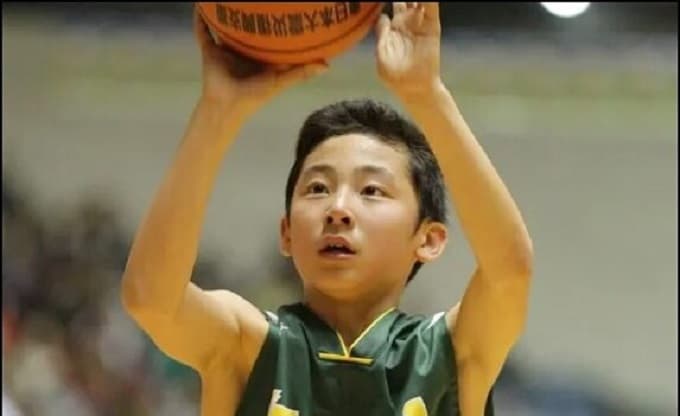
Yuki also noticed numerous NBA and domestic basketball-related videos in his father's room when he first became passionate about basketball. His father was the basketball advisor at the junior high school at the time. He would watch the basketball videos in his father's room before going to sleep. His hero at the time was Yuta Tabuse, the first Japanese to play in the NBA. He also respected Michael Jordan, the basketball god, and liked John Stockton and Jason Kidd, who were good assistants.
After joining a local basketball club, Yuki spent his second and third grade years in elementary school practicing fundamentals rather than playing on the court. He worked on ball rolling and other repetitive exercises on the edge of the gymnasium, and by the fourth grade he had many games with the upperclassmen. By that time, he was even more involved in basketball, practicing on his own with a goal at home. In the sixth grade, he set himself the challenge of shooting 1,000 shots a day. As a result, his team competed in the national tournament for the first time in 16 years, and he scored many points with the shots he had honed in practice, leading his team to the championship.
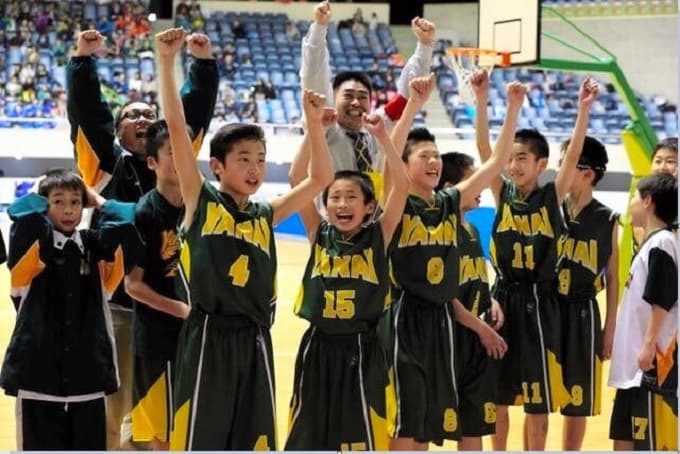
In the spring of 2014, Yuki entered Yanai Junior High School in Yanai City. As a junior high school student, his goal was not to win a national championship with his team, but to balance basketball and his studies. This was because his dream for the future at the time was to enter a local preparatory school, go on to a national university, and become a physical education teacher. He had been confronted with a stark reality when he was in the fifth grade after watching a high school game.
About that time, Yuki said, "Watching the game, I was reminded that good physique and height are an advantage in high school basketball. Of course, I also thought it was simply amazing and fun. But I was small in stature from then on, so my feelings were sinking as I watched the games with my father." At the time, he thought his short stature meant he had no future as a basketball player, so he focused on realistic goals.
With a realistic goal in mind, Yuki attended cram school three times a week while playing in games as a starter from the time he was in the first year of junior high school. In school tests, he maintained a single-digit ranking among about 200 of his classmates. On days when he had cram school, he went to bed around 23:00, and the next day he participated in morning practice, which started before 7:00.
In the summer of his second year of junior high school, he had a life-changing experience. In the first game of the preliminary league for the national tournament, he was beaten up miserably by a team from Okayama Prefecture. In the second half of that game, he was outscored by 40 points, even though his opponent was a reserve player. He was matched up against a player who was regarded as the number one junior high school player in the country, and he was beaten like a champ. Normally, this would have been a setback, but he had experienced the power of one of the best players in the country and found hope that with practice, he too could become one of the best players in the country.
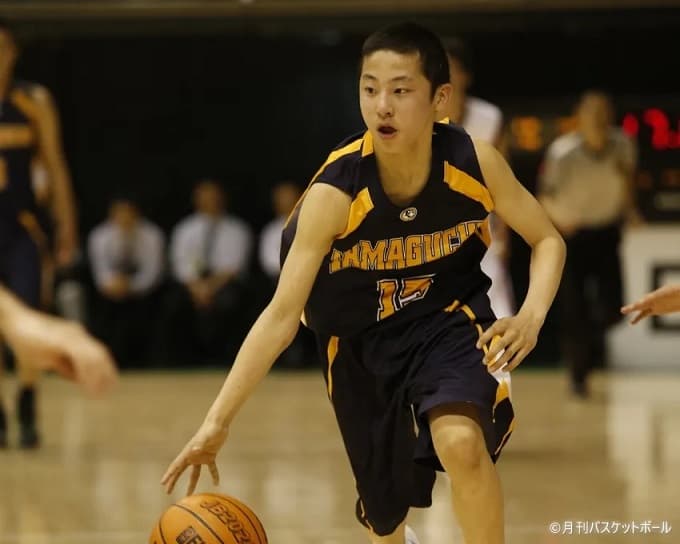
After that tournament, Yuki became the new captain and set a goal with his teammates to make the top 16 in the national tournament. At the same time, he continued his own life goal of "entering a national university from a preparatory school. Although the team's goal was set, junior high school students come from all walks of life: some want to study hard, some want to enjoy school life, and some are serious about their club activities. Therefore, in order to achieve his goal, Yuki focused on unifying the vectors of the club members. Instead of getting angry at a club member who was not putting in the effort to practice, Yuki went around asking him in dialogue why he was not concentrating on club activities. Yuki sought out solutions to this problem and got his fellow members motivated to play basketball.
Yuki talked about those days, "There is a big difference between basketball that someone makes you do and basketball that you do on your own. So I thought it was wrong to get angry at my fellow members and tell them to practice properly. When I found out that the reason why they were practicing improperly was because of their relationships with other club members, I created a forum for discussion to resolve it. In order to draw the members' feelings toward basketball, I constantly talked to them, not only during practice but also before and after practice, choosing my words well."
Yuki and his teammates' hard work paid off, and his team qualified for the national tournament, making it to the top 16 in the country, which was their goal. However, his team's challenge came to an end when they suffered a crushing defeat in the first round of the final tournament. The next battle was the high school entrance examination, which had been his goal ever since he entered junior high school, but he could not change his mind. He was not able to change his mind, because in the game he lost in the final tournament, he had played a poor game as the ace of the team. He was beginning to feel that he wanted to win the national championship in high school.
Yuki was preparing for the entrance examination with such feelings in his heart, but one day after the summer vacation, his father told him that Fukuoka Daiichi High School was inviting him to join their school. Fukuoka Daiichi High School was one of the most famous and powerful basketball schools, having won the top national championship many times. His parents said they would respect Yuki's decision, and he was very torn between the realistic goal of going to a local high school and going to a strong school far from his hometown. He agonized over it all alone and finally decided around December to go to Fukuoka Daiichi High School.
He told us about that time, "My parents might have wanted me to go to a local school. But my desire to play basketball harder and win the championship in Japan won out. Thankfully, my parents said they would support my decision."
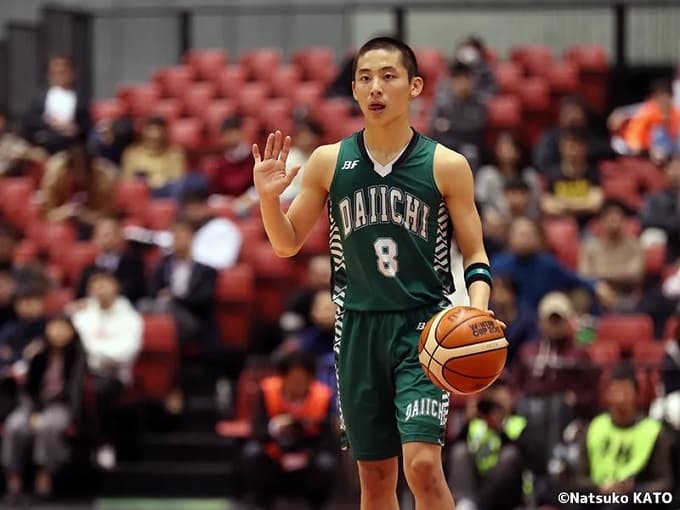
Entering Fukuoka Daiichi High School, Yuki played in games from his first year of high school and immersed himself in basketball even more. One thing coach Ideguchi still remembers about him was the quality of his individual practice. Ideguchi knew of his habit of not only practicing with the team but also practicing on his own since elementary school. Ideguchi was impressed by the way he continued to devise ways to improve even after entering high school.
Ideguchi told us, "He just changed places now, but it seemed that he was practicing the self-practice he had been doing since elementary school, evolving it day by day. When he became a sophomore and then a junior, the practice became even more visible and ingenious. He was practicing dribbling and shooting by himself, using obstacles as opponents and coming up with different variations."
In addition, Yuki often left the dormitory after dinner and returned to the gymnasium to practice. This was because at that time he had a habit of taking a set number of hundreds or thousands of shots during the week before going to games and tournaments. Practice used to be closed on New Year's Day, but since he has been at the school, practice has been possible. Of course, players gather at Fukuoka Daiichi High School with the aim of becoming the best in Japan, and everyone puts in an extraordinary amount of effort. Coach Ideguchi, who has seen many such players, says, "Among them, Yuki is outstanding. He was already crazy."
Due to the rigorous training he put himself through, Yuki won four national championships while still in high school and was selected as one of the best five players in the country. His speed and ability to use his small stature to taunt opponents caught the eye of many basketball clubs. In January 2020 he joined the Santo Neo Phoenix of the B-League (Japan's professional basketball league) through the special designation system. He was about to graduate from high school and became the youngest player in history to play and score points in a B League game.
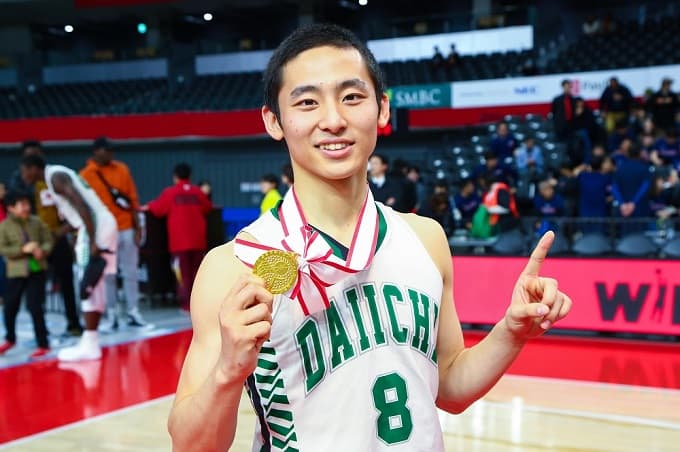
Coach Ideguchi talked about Yuki as a player, "Yuki can shoot, dribble, and do everything. The only thing he can't do is dunk.lol He can do everything by himself, but the fact that he can make the people around him better is amazing. Rather than scoring 40 points by himself, he scores 20 points and creates opportunities for others to score the other 20 points. If the members around him are running, they will get good passes from him, so they run. I think that's his power."
He added, "Yuki communicates well with the head coach and immediately understands the basketball he wants to play. Sometimes he goes beyond what the head coach wants to do. For example, he would come through from a different angle on a pass that I was thinking about. There was a lot of that going on."
Before graduating from high school, Yuki became the youngest player ever to play in the B League, so he had the option of going straight to the pros. However, he chose to go on to college. The reason he went to college was to build the physical and muscular strength needed to play professionally. He also thought it was important to improve his basketball IQ and broaden his human qualities under Coach Rikugawa, who invited him to the university.
In April 2020, Yuki entered Tokai University, but was forced to cancel matches and training due to the new corona virus (COVID-19). He temporarily returned to his hometown and worked on strengthening his physicality, which he felt was lacking in himself from his experience in the professional league. This helped him win the All-Japan University Basketball Championship in his first year of college, and he was awarded the 3-point king. In addition to his collegiate activities, he joined the Yokohama B-Corsairs as a specially designated player in December 2020. He also participated in the All-Japan University Basketball Championship in December 2021, where his team finished second.
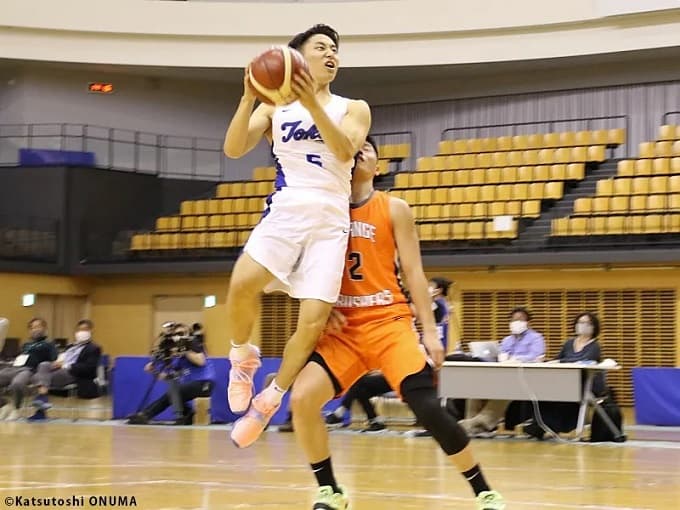
While participating in the activities of the Yokohama Bee Corsairs in addition to his university life, Yuki began to feel that he wanted to play professional basketball. Although he had two years left of college before graduation, he began to think that the best environment in which he could devote himself to basketball was by joining a professional team. Therefore, he decided to drop out of college to become a professional player. Both coach Rikugawa and his parents supported him in his decision.
When he decided to drop out of college, he said, "I respect coach Rikugawa because he has broadened my basketball horizons. He taught me a lot of things about basketball that I didn't know, and even though it was only for two years, it was a very meaningful time for me. I was able to learn the basics of how to play professionally, and I was able to grow as a person through my college life. I have no regrets about dropping out."
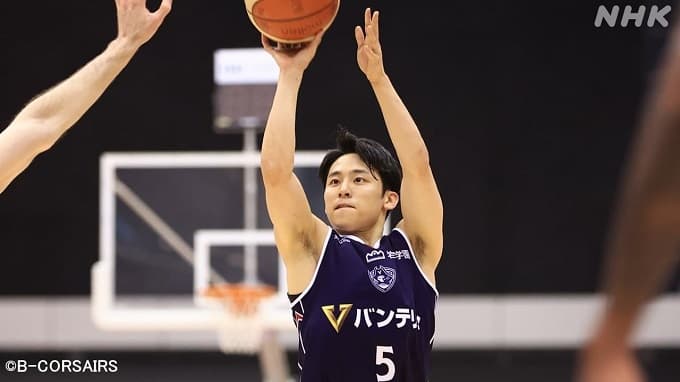
Yuki dropped out of Tokai University in March 2022 and signed a professional contract with the Yokohama B-Corsairs. Furthermore, in July 2022, he played a game for Japan in the Asian qualifiers for the World Cup. In addition, he played only 13 minutes against Kazakhstan, recording 8 assists and 2 steals to turn the tide after falling behind in the first half. Throughout the tournament, he played in all five games, averaging 11.7 minutes, 4.4 points, 4.4 assists, and 2.2 steals per game. He earned B-League MVP, Best Five, and Rookie of the Year honors during the 2022-23 season in Japan.
Between immediately after the World Cup and June, when the NBA draft was conducted, Yuki received contacts from several NBA clubs. From among them he chose the Memphis Grizzlies and their Exibit 10 contract. About the contract, he said at a press conference, "I was very happy to receive offers from several teams despite my short stature. At the same time, there was a part of me that was surprised," he said, revealing his honest feelings when he learned of the offers.
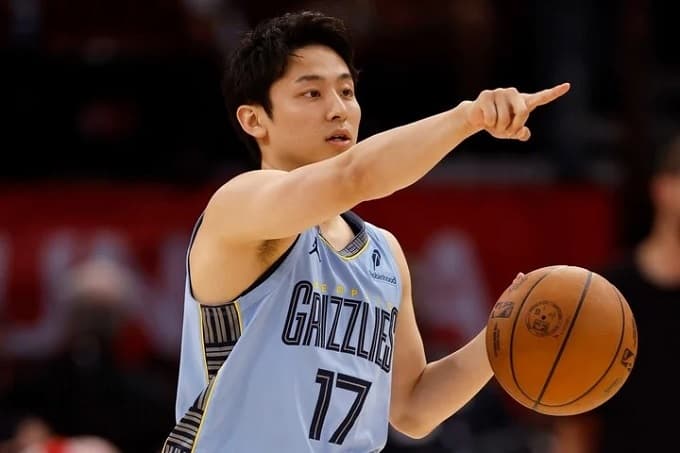
As for why he chose the Grizzlies over the other offers, he replied, "I was most enthusiastic about the Grizzlies offer. They were very specific about wanting me to be like Jacob Gilyard, a player of my size, and I had a great vision of what they wanted me to be like. I'd been studying him for some time, watching him play and wondering how I could make it in the NBA at that size. That's why I'm so happy to be going to the Grizzlies."
Yuki then signed a two-way contract with the Grizzlies on October 19, 2024, instead of an Exibit 10 contract. He also made his NBA debut on October 26, when he played against the Houston Rockets. He became the fourth Japanese player to play in the NBA, following Yuta Tabuse, Yuta Watanabe, and Rui Hachimura.
sources